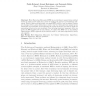1762 search results - page 64 / 353 » Experimental research in evolutionary computation |
IPPS
2006
IEEE
15 years 8 months ago
2006
IEEE
Inference of phylogenetic trees using the maximum likelihood (ML) method is NP-hard. Furthermore, the computation of the likelihood function for huge trees of more than 1,000 orga...
128
click to vote
CEC
2007
IEEE
15 years 2 months ago
2007
IEEE
— The computation of periodic orbits of nonlinear mappings is very important for studying and better understanding the dynamics of complex systems. Evolutionary algorithms have s...
130
click to vote
CORR
2002
Springer
15 years 1 months ago
2002
Springer
This position paper argues that the Baldwin effect is widely misunderstood by the evolutionary computation community. The misunderstandings appear to fall into two general categor...
101
click to vote
GECCO
2007
Springer
15 years 8 months ago
2007
Springer
Crucial to the more widespread use of evolutionary computation techniques is the ability to scale up to handle complex problems. In the field of genetic programming, a number of d...
132
click to vote
JUCS
2010
15 years 12 days ago
2010
: River Formation Dynamics (RFD) is an evolutionary computation method based on copying how drops form rivers by eroding the ground and depositing sediments. Given a cost-evaluated...



